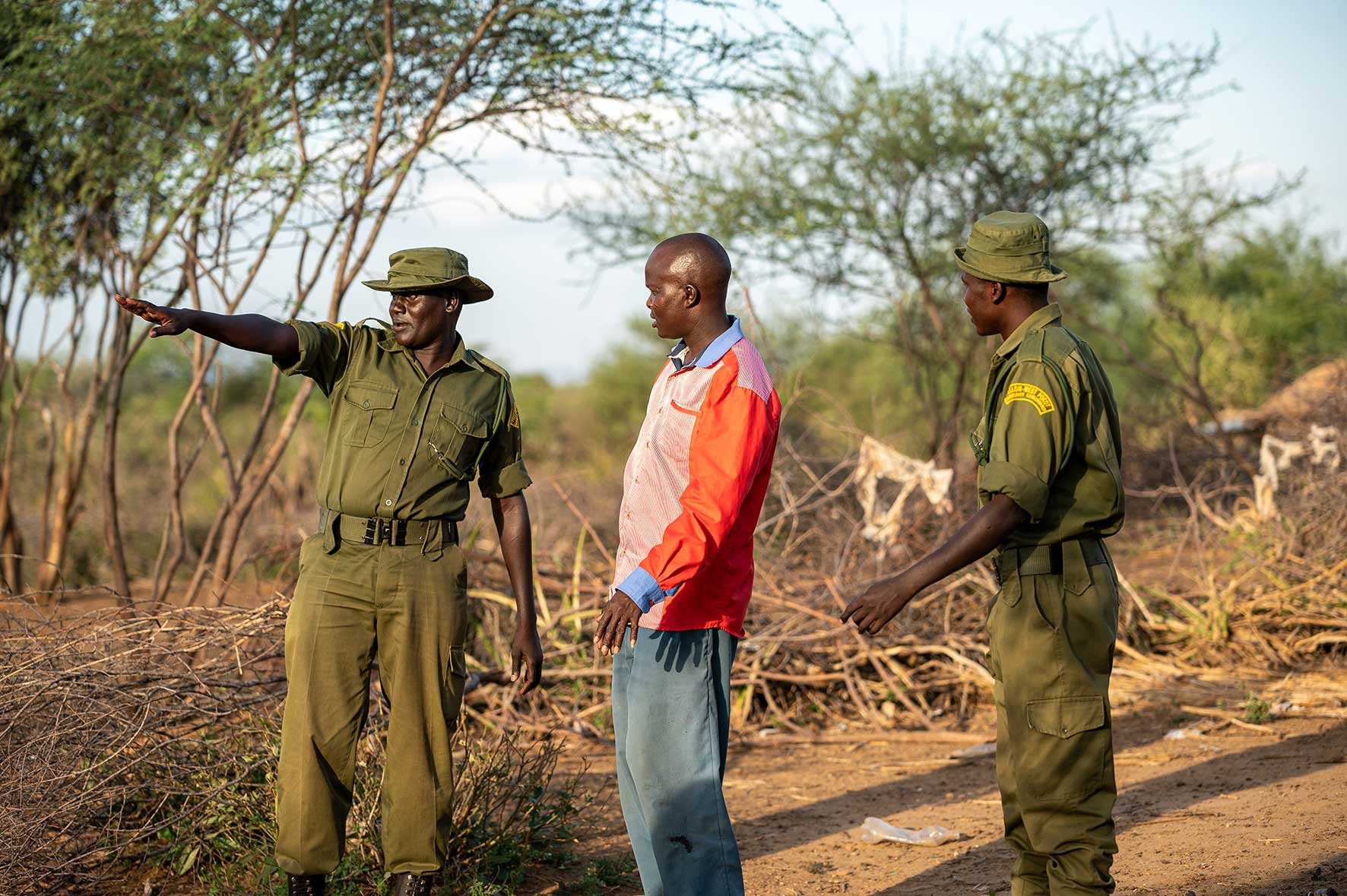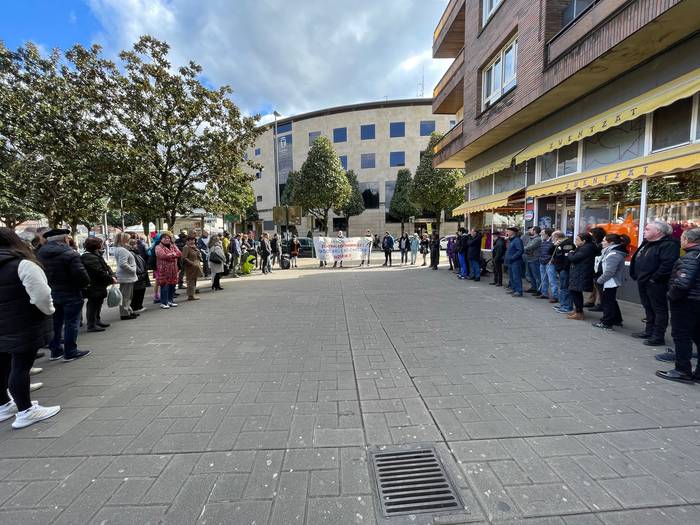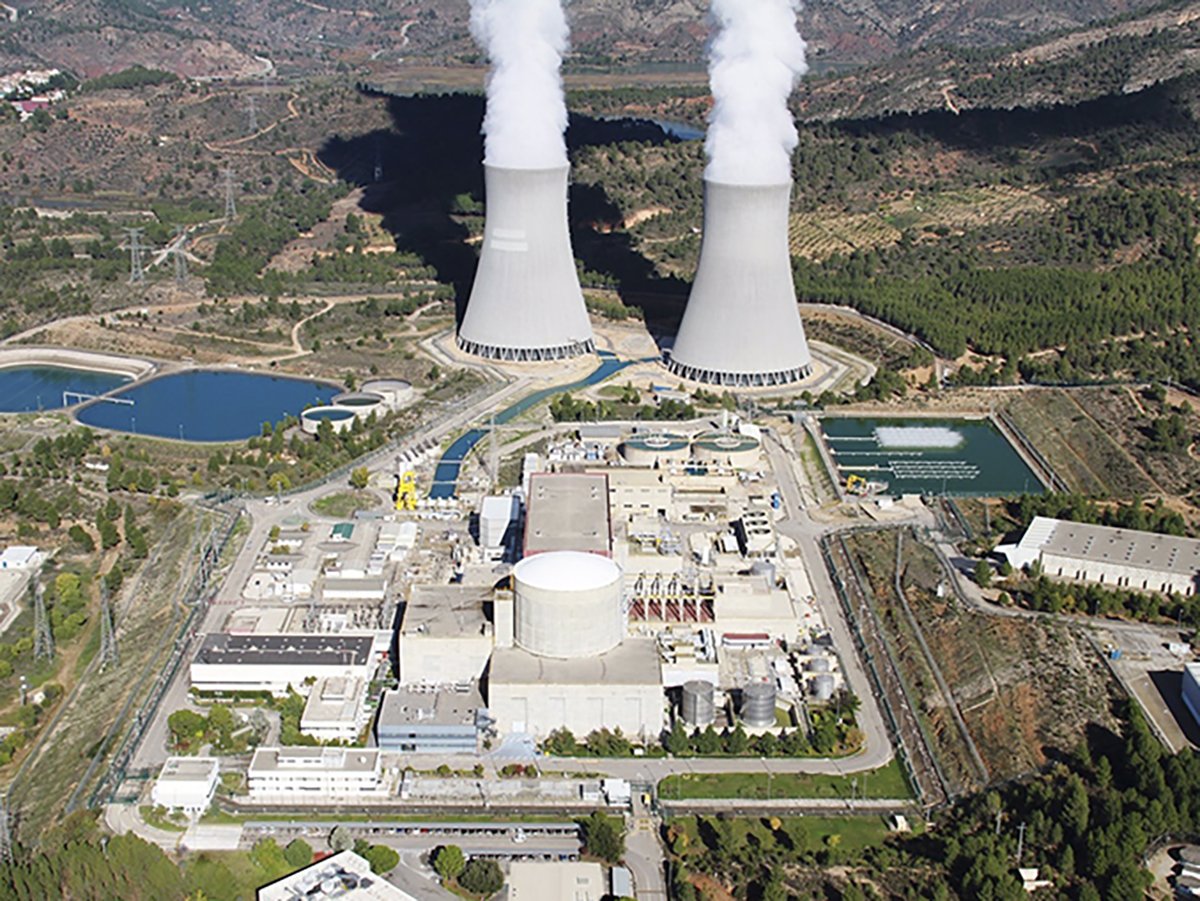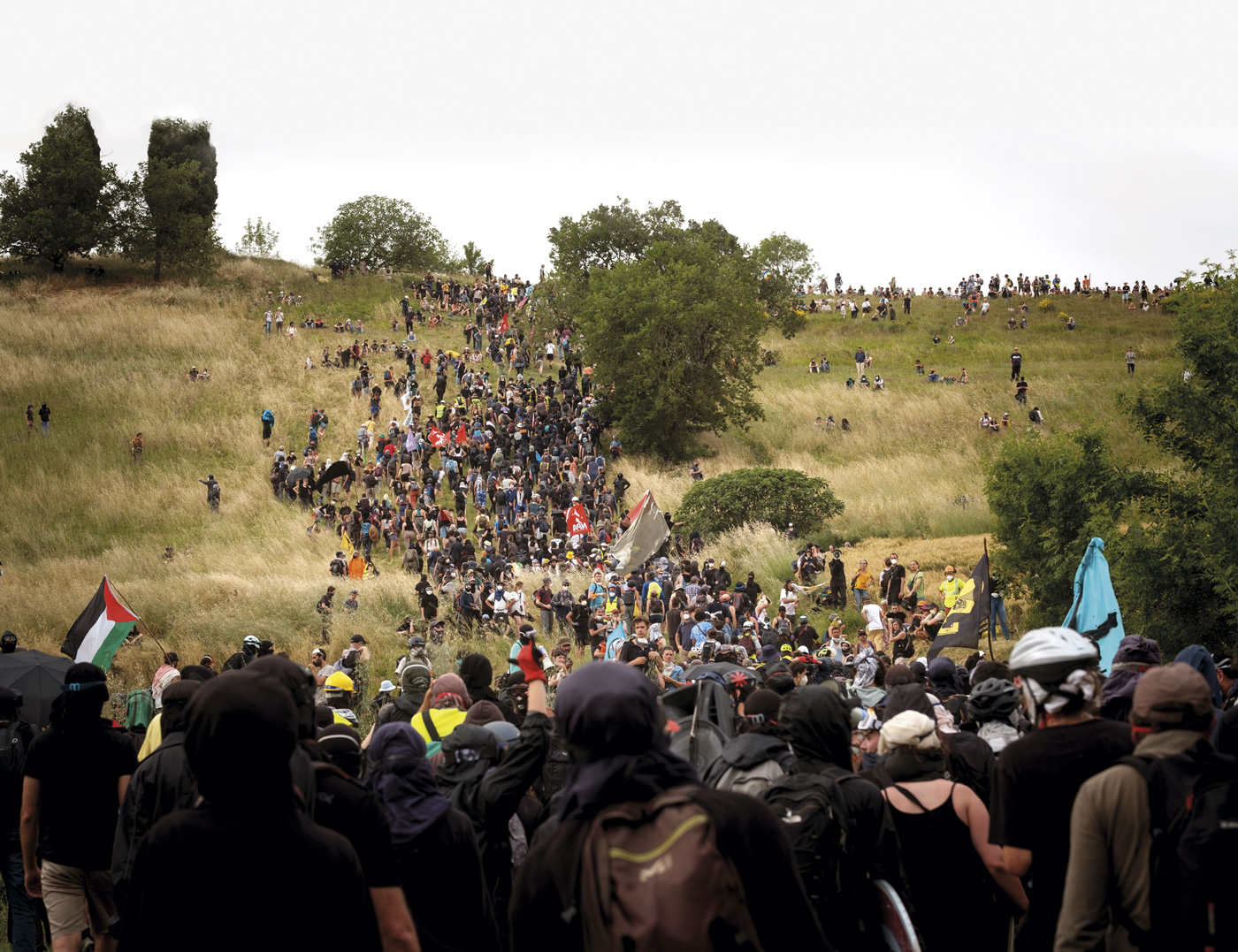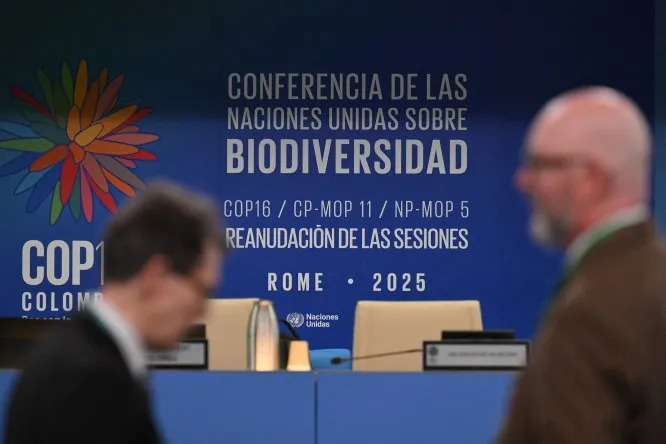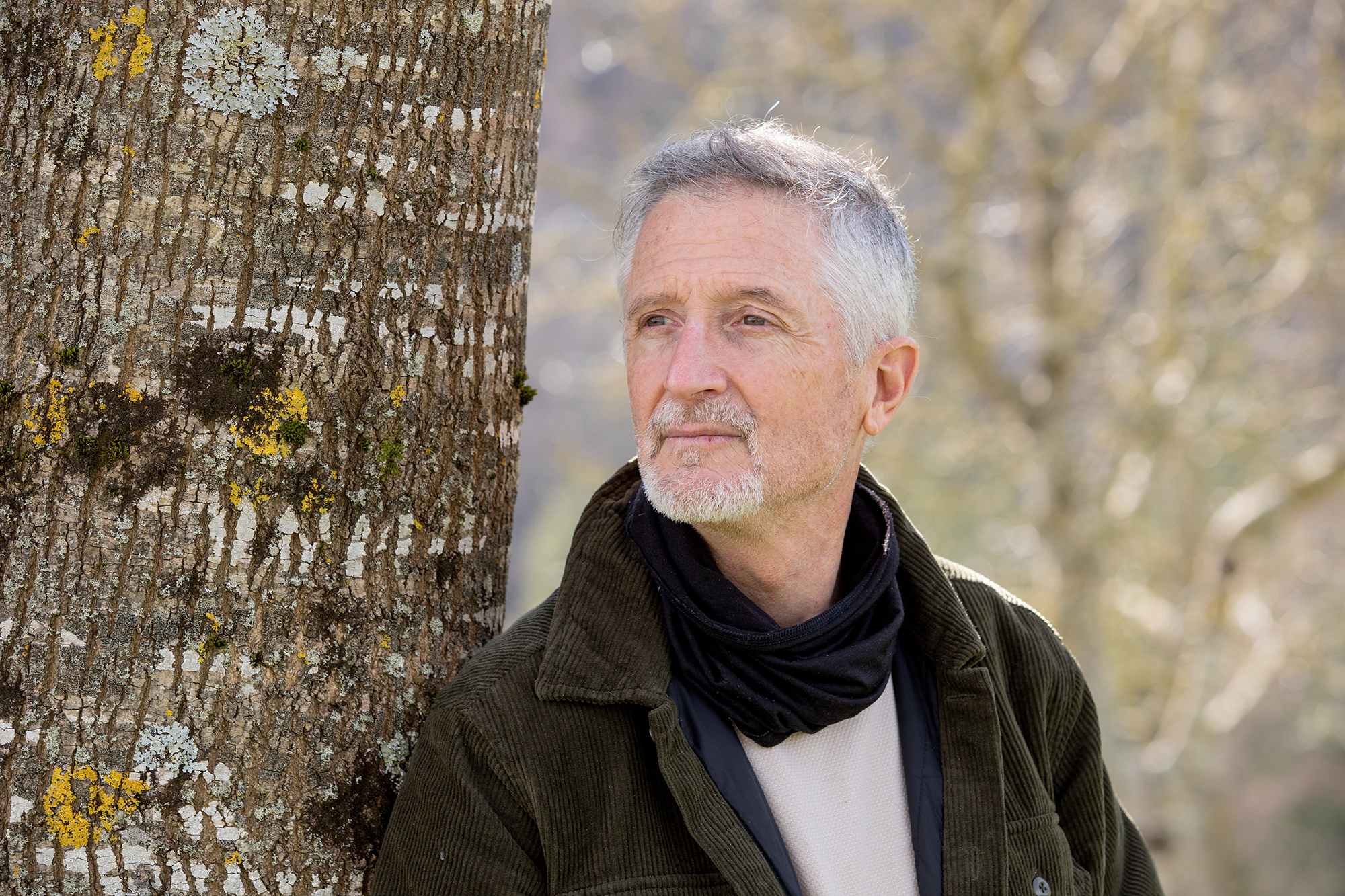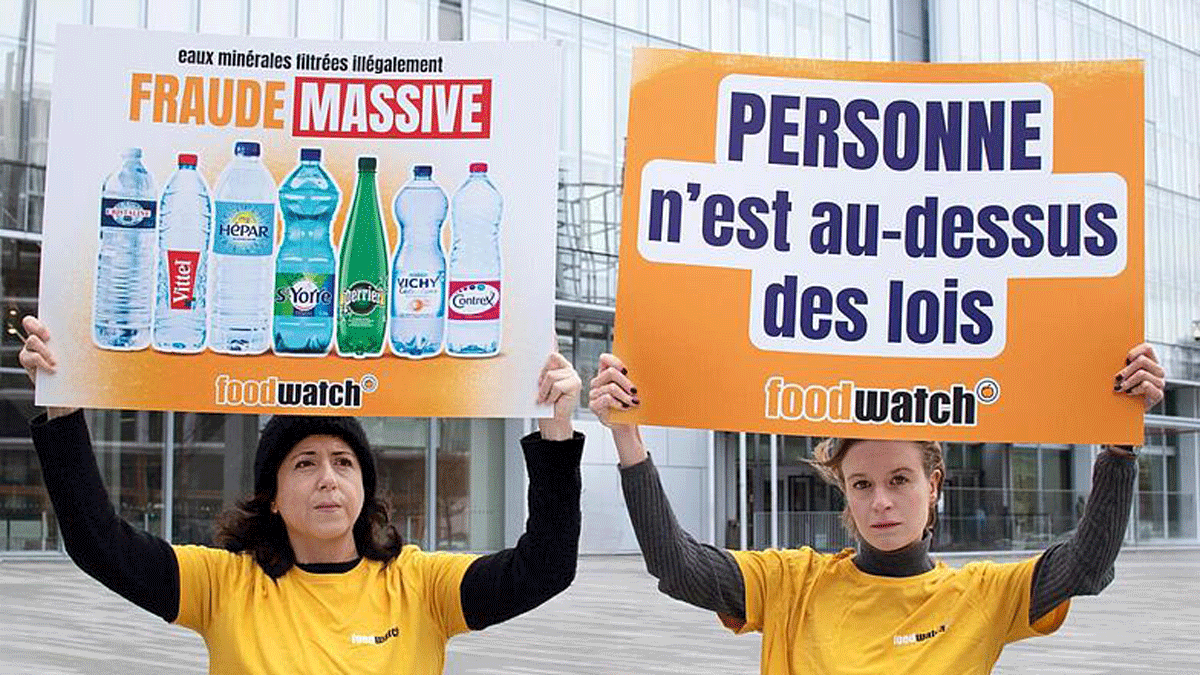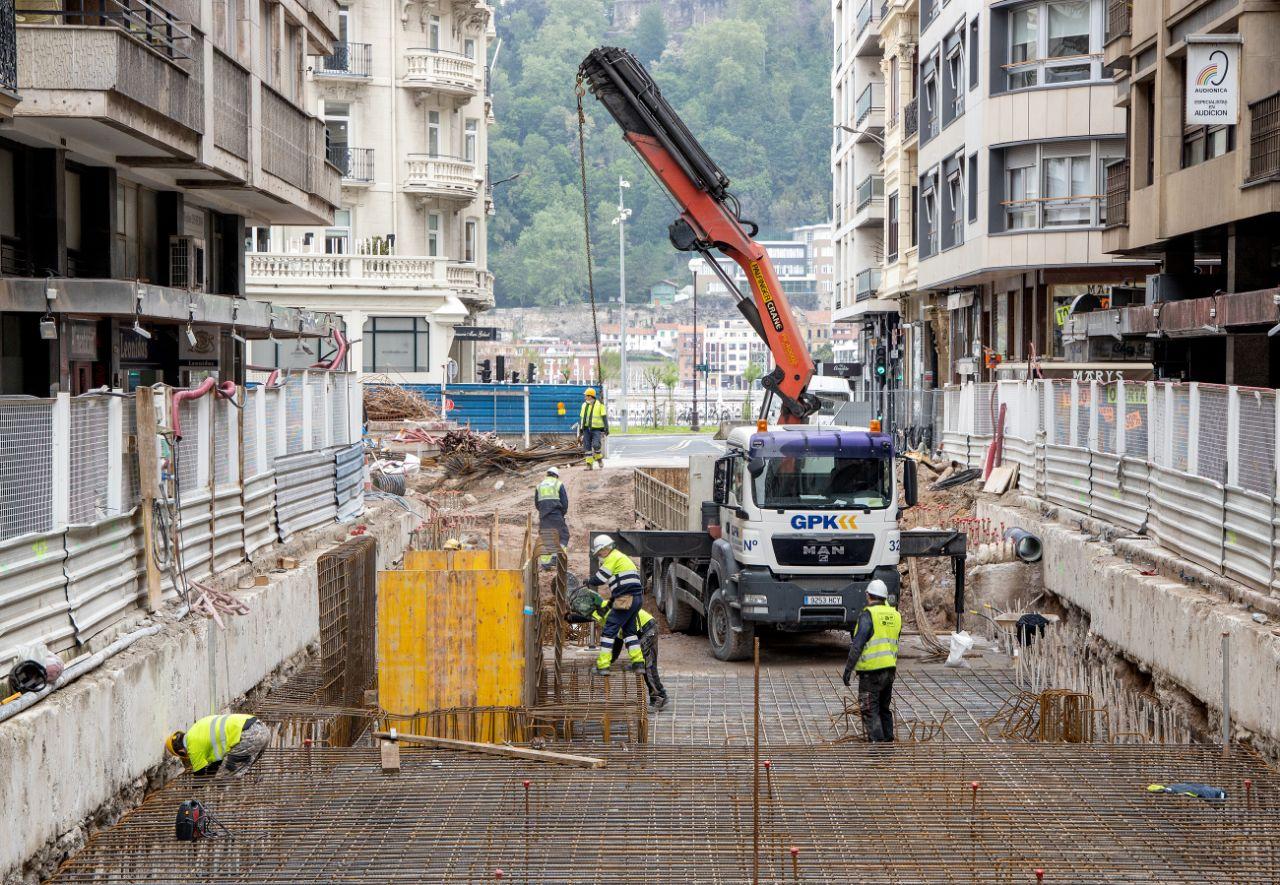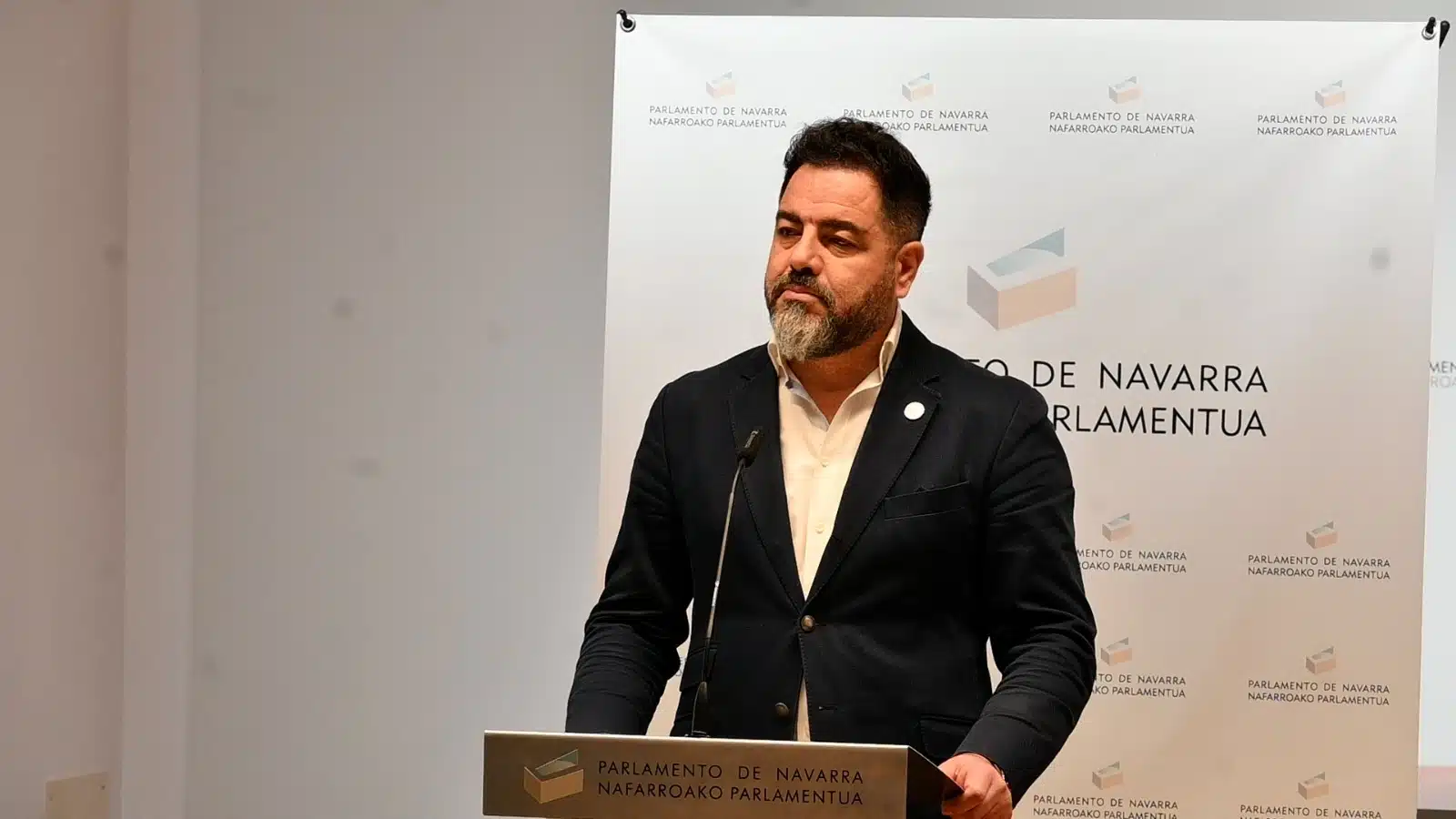"It's not a transition, it's a speculation."
- Organized by Euskal Herria Bizirik and with the call of 84 agents, 2,200 people have appeared in "Defense of the Earth" in Azpeitia on April 13. The morning attendees have analysed through four workshops and a round table the damage that the painted macro-projects of green produce in the territory and on Earth and what is the final objective they pursue. Euskal Herria Bizirik confirmed her struggle and announced the next national meeting: the march to Mount Kolitza on 26 May.

The one who approached April 13 found Azpeitia dressed in banners like "Sañu Bizirik", "Mendia aske", "AHT gelditu", "Erdiz bizirik", "Aroztegia gelditu", "Mendietan ez"... With this day of mobilization celebrated in Basque election day, show
Four parallel workshops were held in the morning: Basque feminism in the defence of the Earth; Landing the contributions from agroecology in the context of the eco-social crisis (see video here); Loss of biodiversity: causes and consequences, third (see video here); and Corporate energy transition and megaprojects.
At noon they meet in the same room to hear the experience of a Aragonese militant (Platform defense territory Cincovillas) and Galician (Ecoloxists Galicia Atlantica e Verde).
.jpg)
The talks, workshops and round tables held throughout the morning have served to inform and reflect together with the public: Is this energy transition model sold to us as the only one" (that is the idea that several rapporteurs have highlighted) effective in achieving the objectives they argue before the public? What logic follows this "green painted" transition? Are the objectives of energy companies and the political positions they communicate with them compatible with meeting the needs of citizens? And as a young man in the audience has asked, "Isn't it up to us to think about how to derail the capitalist system that is the root of all these projects that are wounded to Earth?" Will the macro-projects end differently? ".
.jpg)
The first part of the day has been full of content and during the meal, more than a hundred people have taken power with the beautiful food prepared by the Sañu Bizirik with the farmers of the area. Throughout the day, the artistic exhibition of defence of the territory Hamaika zergatik, which brings together works of eleven Basque illustrators, has been presented.
“This transition model that they sell us as the only one was born dead”
With the penalty of choosing one of the four workshops, he who is writing enters the Corporate Energy Transition and the mega-projects, where he meets the conference of Álvaro Campos, friend of the Martintxo Field of the Subai Foundation. "When we say no to this transition, we are not questioning whether we need a transition. What we're saying is that we don't want that, that we need another, and that transition that's underway doesn't take us anywhere," Campos has started. And he continued: "Taking into account data from the International Energy Agency (IEA), there are not enough materials to build the renewable infrastructure that would be needed to meet what the transition agendas are proposing. That's why it's a transition that's been born dead. The message conveyed by the IEA is that each country ensures the necessary means to obtain the materials for its transition. This opens the door to a geopolitical scenario of great tension."
Campos has explained that fossil fuels and renewables have very different characteristics. He points out that oil is a "condensed force", easy to transport in barrels and with a great capacity for concentration: "It has a great capacity for concentration of power, decisions and benefits, which is closely related to the nature of capitalism. I think there would be no capitalism, without that capacity of fossil energies. Fossils have allowed to build a globalized socioeconomic structure, which throughout history has no parallel." Because the characteristics of renewables are different, he argued that this should lead us to "change everything": "They are intermittent, we cannot decide when to turn on renewable energy generators and what power to. We will have much less energy and power. Renewable energies are spread throughout the territory and are much more difficult to transport." But they have the advantage of being modular, scalable. According to Campos, this allows the citizens united to meet their needs to start and manage the energy generators, near them and on a scale to their measure: "A wind power plant of 210 meters is only a very functional form to the capital, but not the only way to understand a windmill".
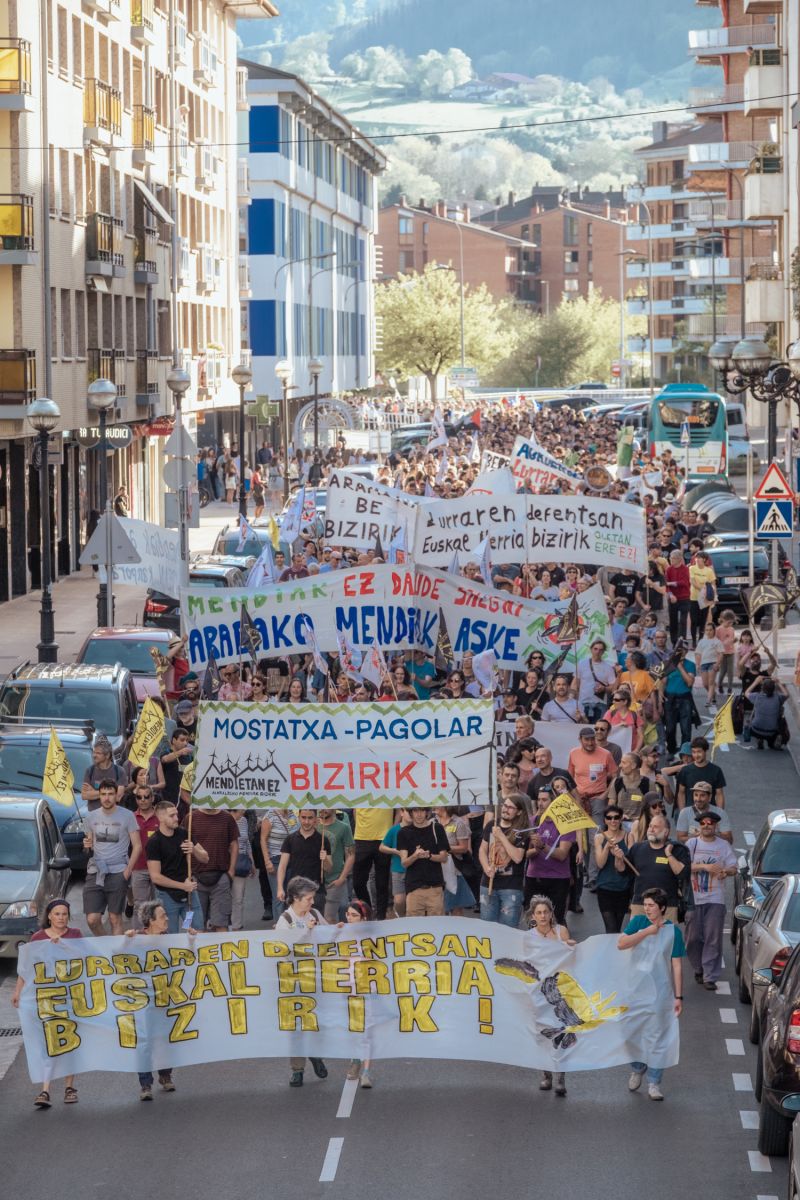
Below is how the energy system is organized. In his slate scheme he represented energy producers on one side: "There are very few, 10 to 15 promoters in total. Those already working with fossils have been joined by those from construction and vulture funds. For them, mega-projects for renewables are financial tools, and their ultimate goal, which the speeches say, is for a lot of capital to become something bigger. And for that they use traditional speculative formulas. For the capital that is correcting the transition, it's a matter of how much money it can get and the more, the better." Campos explains that these companies pour the energy they produce into the high-voltage network and charge it for the amount they pour, according to the price of electricity at that time.
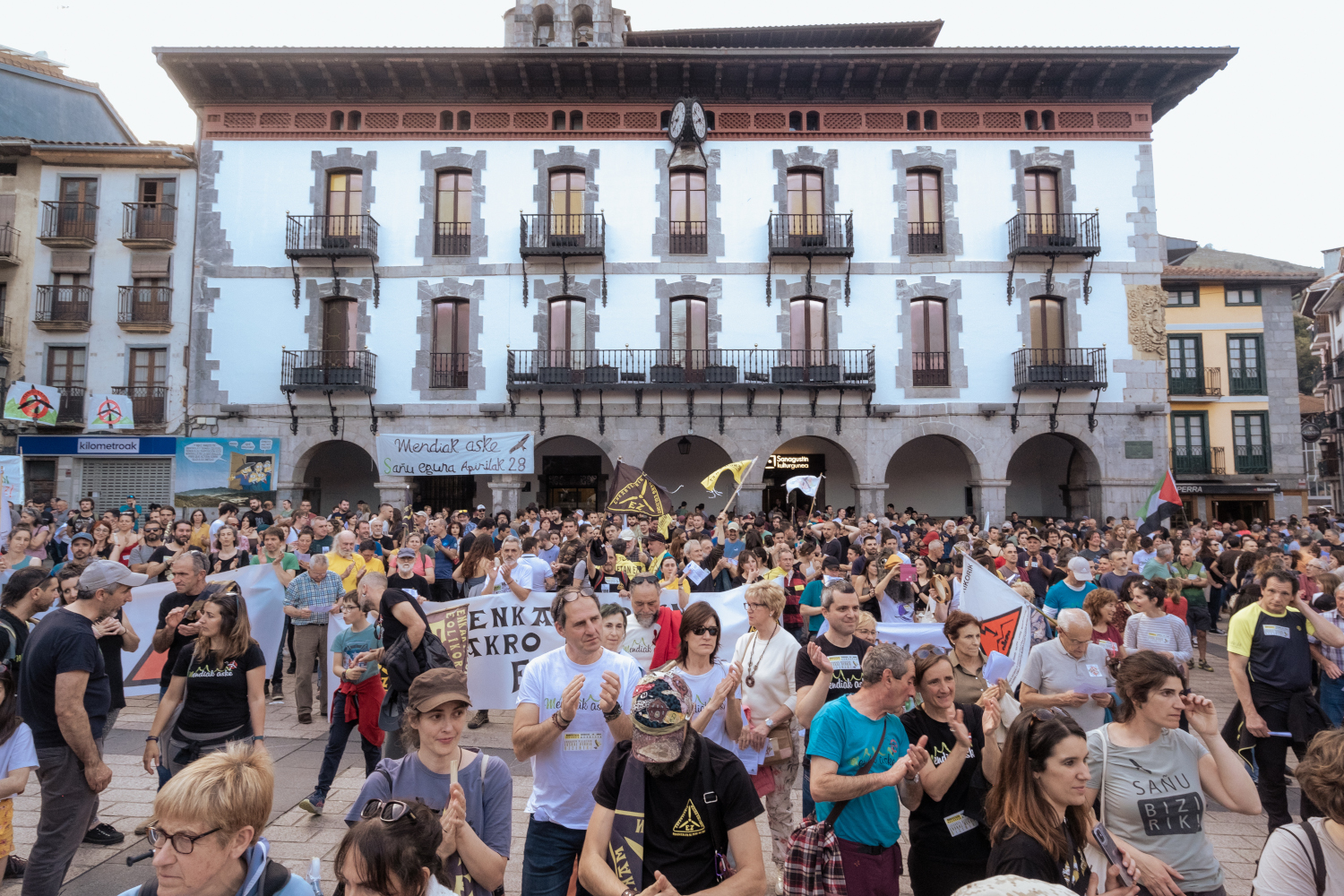
The high voltage network appears at the center of the scheme drawn on the board. It continues to explain that the high-voltage network was public until 1997, when it was liberalized and became the property of Spanish Electricity Network. Currently, this organization is 80% private and with 20% public control: "Since liberalization, without exception, the president of Red Eléctrica has been linked to the government of the PSOE or the PP. Today is Beatriz Corredor, who was secretary of State for Housing at the time of José Luis Rodríguez Zapatero", warns Campos, to point out that he is one of the main revolving gates. On the proposal of the Spanish Electricity Network and approved by the Spanish Government Council, he explains that the power transmission capacity of the high-voltage network is constantly increasing: "And that has no limits, because the ultimate goal is to generate profits (it is one of the most coveted companies listed in the Ibex 35)." In addition, for the high-voltage network to sell energy to more and more consumers, work is being done on the integration of European markets, according to Campos: "The most dramatic example is the Gatika-Bordeaux underwater interconnection. When it came out in 2017, we didn't understand what they wanted. Now you see that they want to specialize the territories and that the Iberian Peninsula has had to be a supplier of renewable energy, even though the so large network has a very low efficiency, because a lot of energy is lost along the way".
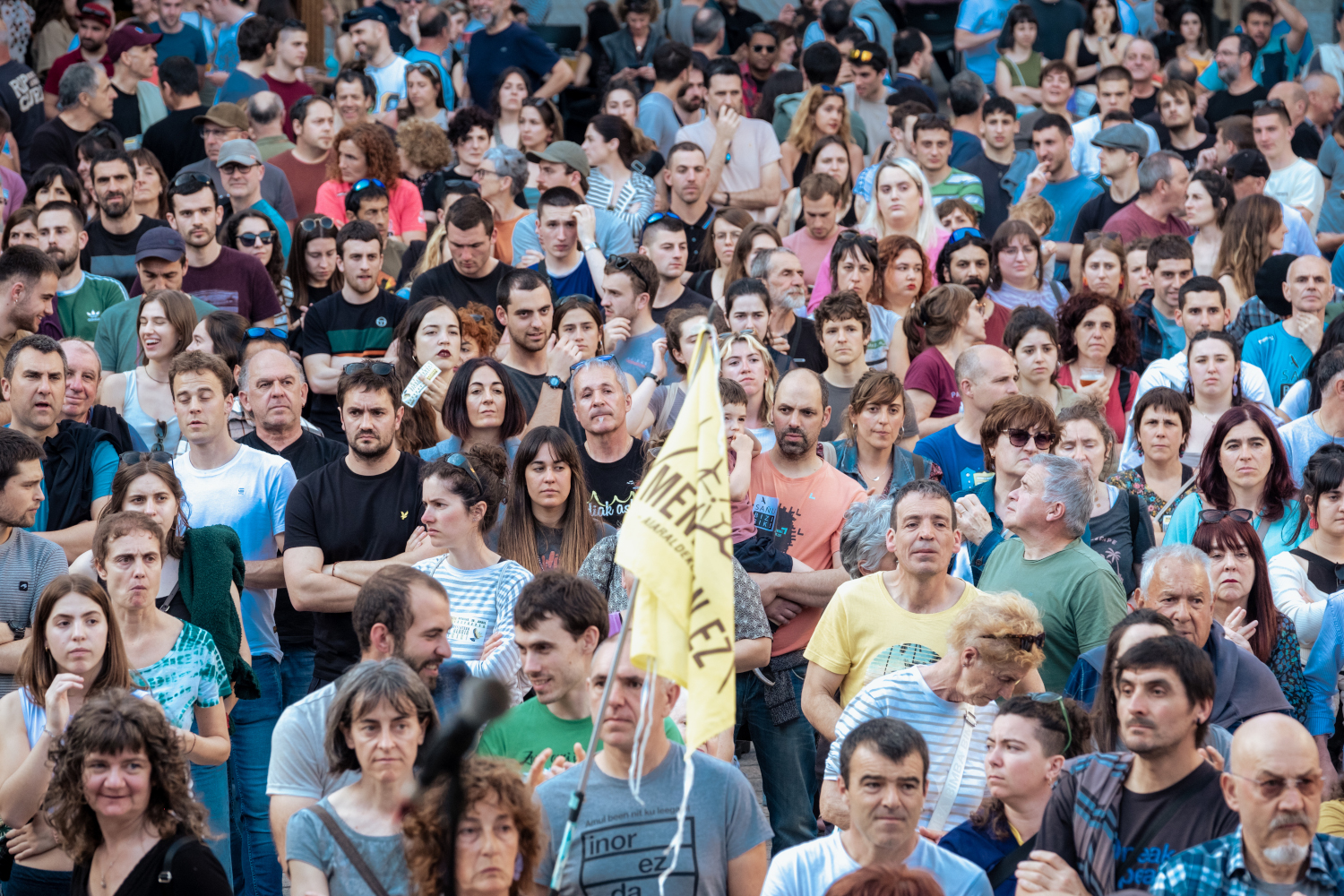
Returning to the scheme drawn on the board, he points out that along with the high voltage network there are substations that connect with the low voltage network. Citizens and businesses are connected to this low voltage network. Campos recalls that when they liberalized the electricity system, the low-voltage network built with everybody's money was "given away" to Iberdrola. It argues for expropriating this network or establishing control mechanisms, since it considers that the low voltage network is key to a different transition, as this network opens the possibility for citizens to change towards sovereignty. How? Analyzing the needs and resources of its territory and placing small energy generators near the consumption sites. But he announced that "if we start to work seriously in a village, to generate energy in it and to pour into the low-voltage network, we will soon be told that there is no capacity in that network to capture so much energy, while millions of euros are being invested to increase the capacity of the high-voltage network. Why is the transition to this model not encouraged? Because that's where we can get a lot of people to produce energy and not macro-projects." He has analyzed the connections between the sovereignty built from below and the lower energy consumption, while "in this transition of corporations they give an inverse message to society, which we can continue to consume as usual".
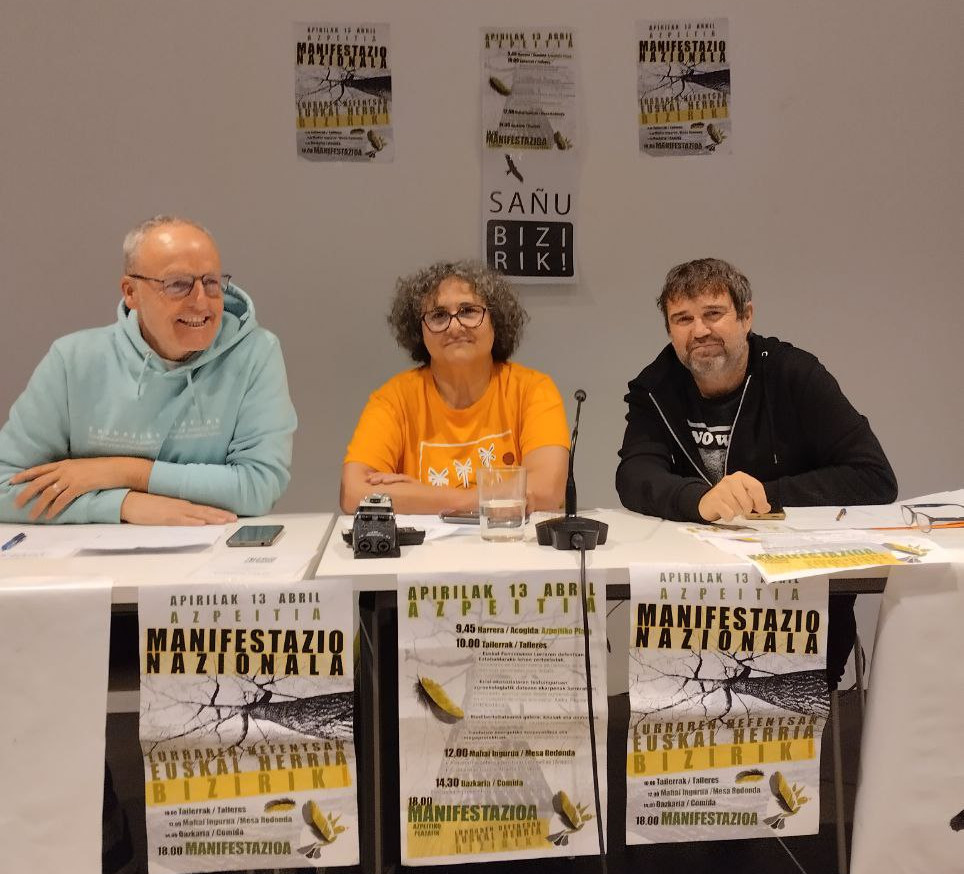
Teachings from Galicia and Aragon
At the round table to share experiences in Aragon and Galicia, the voice of Nery and José Luis has heard what these countries are suffering. In Aragon they produce 150% of the electricity they consume, in Galicia there are municipalities with a windmill of two inhabitants... The two members who have seen their territories sewn with renewable macroprojects explain: "It is not transition, it is speculation. The citizen looks at the project they are going to do in their people, but he cannot even imagine what wave comes to the whole territory. That's why we have to unite struggles and have an overall view."
Nery speaks unapologetically of the Galician experience: "The opposition must be made by the citizens and without money. Associations benefiting from subsidies are not free, they are always limited. I am not looking at the political parties, because at most they are going to stand against a particular project, but at the same time they are going to justify a project elsewhere... The municipalities are going to say that the militants are fired "we have made allegations...", but it is not enough: if the city does not want, on its grounds the project is not done, they just have to not give the company permission or leave the messages. The problem is money, so they get into the deal. And public institutions, instead of imposing obligations on companies to protect land, citizens and biodiversity, are re-flexibilizing environmental laws."
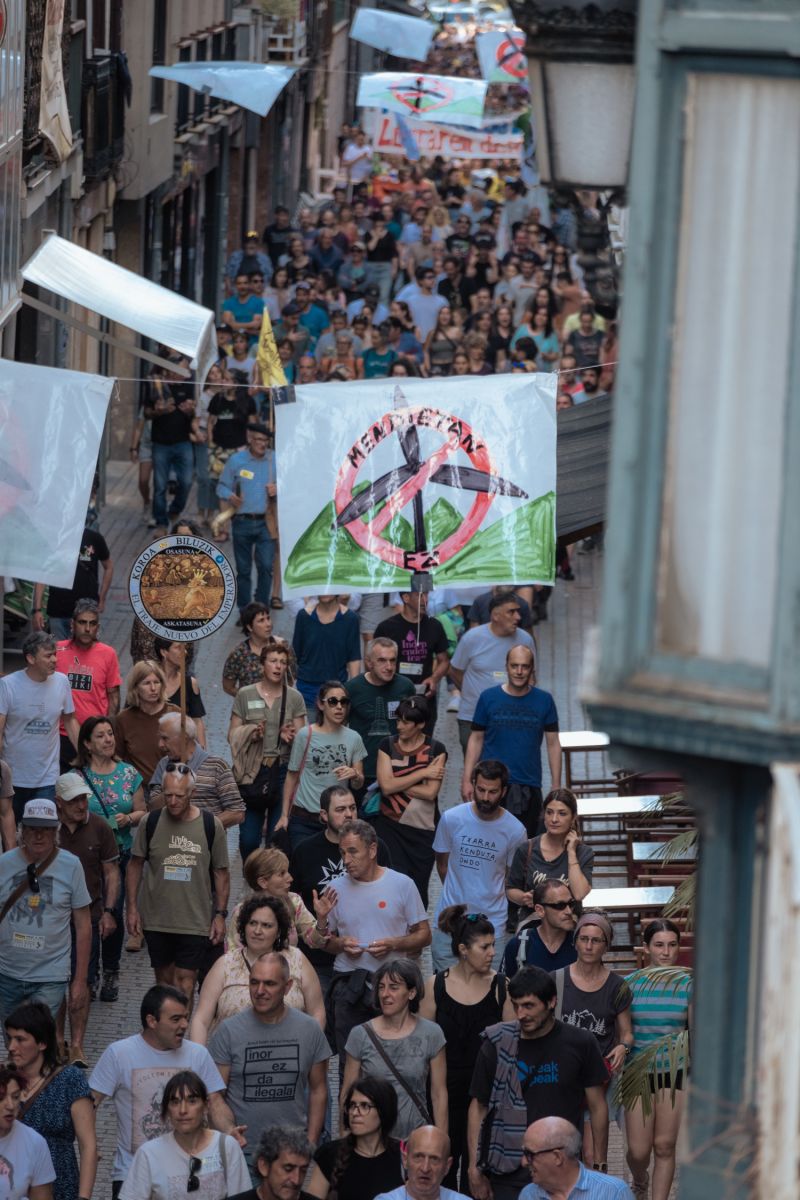
Colorful manifestation
The Azpeitia event has been a vivid demonstration: the list of the 84 adherent agents and the many banners that they have brought to the streets has shown that the struggles between the various macro-projects, many of them local, are being added.
The Euskal Herria Bizirik network brings together a broad profile of citizenship. They say, "from baserritars to academia." Many of these people have initially joined a group to deal with a macro-project they want to build in their environment, in which they have had to start reading the project, to dress in technical information, to complete the allegations to face the project... but "once the initial zaplasta has been received, they have been forming and acquiring an overview", explained some militants. Among them, discourse is being woven and strengthened. They criticize the capitalist system that endangers the Earth and promotes the transition to another system that makes the Earth livable for everyone: "We can call it growth, localization, sovereignty, resilience... but technically it is possible to develop models," has been heard in one of the workshops.
Full presentation of two morning conferences
Agintari gutxik aitortzen dute publikoki, disimulurik eta konplexurik gabe, multinazional kutsatzaileen alde daudela. Nahiago izaten dute enpresa horien aurpegi berdea babestu, “planetaren alde” lan egiten ari direla harro azpimarratu, eta kutsadura eta marroiz... [+]
Mendizale batek asteburuan ikusi du animalia Lapurdiko Azkaine herrian, eta otsoa dela baieztatu du Pirinio Atlantikoetako Prefeturak. ELB lurraldean "harraparien presentziaren kontra" agertu da.
Elkarretaratzea egin zuen Aiaraldeko Mendiak Bizirik plataformak atzo Laudioko Lamuza plazan, Mugagabe Trail Lasterketaren testuinguruan.
Nori ez zaio gustatzen ahuakatea? Ia denok atsegin dugu fruitu berri hori, di-da amaren batean etxekotu zitzaigun. Zenbat urte da ba dendaero ikusten hasi garela? Gure mahaietara iritsi aurretik, historia luzea du.
Gipuzkoako hamaika txokotatik gerturatutako hamarka lagun elkartu ziren otsailaren 23an Amillubiko lehen auzo(p)lanera. Biolur elkarteak bultzatutako proiektu kolektiboa da Amillubi, agroekologian sakontzeko eta Gipuzkoako etorkizuneko elikadura erronkei heltzeko asmoz Zestoako... [+]
Leihatila honetan behin baino gehiagotan azaldu ditugu Ama Naturaren engainuak bere izakiak babestearren. Batzuetan, erle edo liztor itxura zuten euliak ekarri ditugu, beste batzuetan inongo arriskurik ez duten arrisku-kolorazioko intsektuak ere bai (kolorazio aposematikoa... [+]
Udaberri aurreratua ate joka dabilkigu batean eta bestean, tximeletak eta loreak indarrean dabiltza. Ez dakit onerako edo txarrerako, gure etxean otsailean tximeleta artaldean ikustea baino otsoa ikustea hobea zela esaten baitzen.
Espainiako Estatuko zentral nuklearrak itxi ez daitezen aktoreen presioak gora jarraitzen du. Otsailaren 12an Espainiako Kongresuak itxi beharreko zentral nuklearrak ez ixteko eskatu zion Espainiako Gobernuari, eta orain berdin egin dute Endesak eta Iberdrolak.
"Historikotzat" jo du otsailaren 27an plazaraturiko epaia Lurraren Altxamenduak sare ekologista antikapitalistak. Bere aldetik, epaiaren "krudelkeria" salatu eta helegitea jarriko duela jakitera eman du Frantziako Estatuak. Duela hogei urte baino gehiago jarri... [+]
Iazko urriko bileran lortu ez zuten akordioa erdiestea espero dute COP16ko parte-hartzaileek, eta ostegun honetan dute gailurraren azken eguna. 2030. urtea bitartean, bioaniztasunaren alde 200.000 milioi dolar bideratzeko engaiamendua hartu zuten 2022ko COP15 gailurrean, eta... [+]
Biologian doktorea, CESIC Zientzia Ikerketen Kontseilu Nagusiko ikerlaria eta Madrilgo Rey Juan Carlos unibertsitateko irakaslea, Fernando Valladares (Mar del Plata, 1965) klima aldaketa eta ingurumen gaietan Espainiako Estatuko ahots kritiko ezagunenetako bat da. Urteak... [+]
Nola azaldu 10-12 urteko ikasleei bioaniztasunaren galerak eta klima aldaketaren ondorioek duten larritasuna, “ez dago ezer egiterik” ideia alboratu eta planetaren alde elkarrekin zer egin dezakegun gogoetatzeko? Fernando Valladares biologoak hainbat gako eman dizkie... [+]
Ur kontaminatua ur mineral eta ur natural gisa saltzen aritu dira urte luzeetan Nestlé eta Sources Alma multinazional frantsesak. Legez kanpoko filtrazioak, iturburuko ura txorrotakoarekin nahasi izana... kontsumitzaileen osagarria bigarren mailan jarri eta bere interes... [+]
Satorralaia plataformak eman du gainkostuaren berri, informazioa Jaurlaritzari eskatutako txosten batetik aterata. Donostiako metroaren Mirakontxa-Easo zatiaren lanak 53 milioi eurotan esleitu ziren, eta egungo aurrekontua 139,4 milioi eurokoa da. Donostiako metro-pasantearen... [+]
"Gasteiztik egin ezean, ez da egingo", adierazi du PSNren bozeramaile Ramón Alzorrizek. Kontra azaldu dira Geroa Bai, UPN eta PP.








